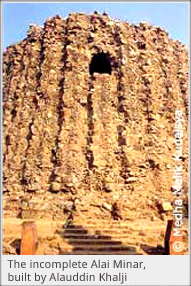The founder of the Khalji Dynasty in South Asia, Malik Firuz, was originally the Ariz-i-Mumalik appointed by Kaiqubad during the days of decline of the Slave Dynasty. He took advantage of the political vacuum that was created due to the incompetence of the successors of Balban. To occupy the throne, he only had to remove the infant Sultan Kaimurs. On June 13 1290, Malik Firuz ascended the throne of Delhi as Jalal-ud-din Firuz Shah. Khaljis were basically Central Asians but had lived in Afghanistan for so long that they had become different from the Turks in terms of customs and manners. Thus the coming of Khaljis to power was more than a dynastic change. As majority of the Muslim population of Delhi was Turk, the arrival of a Khalji ruler was not much welcomed. Yet Jalal-ud-din managed to win the hearts of the people through his mildness and generosity. He retained most of the officers holding key positions in the Slave Dynasty. His own nephew and son-in-law Alauddin Khalji, killed Jalal-ud-din and took over as the new ruler. Alauddin’s reign is marked by innovative administrative and revenue reforms, market control regulations and a whirlwind period of conquests. It is considered the golden period of the Khalji rule. However, before the death of Alauddin, his house was divided into two camps. This resulted in the ultimate collapse of the Khalji dynasty. On one side were Khizar Khan (Alauddin’s son and the nominated hair to the throne), Alp Khan (Khizar’s father in law and the governor of Gujrat) and Malika-i-Jehan (wife of Alauddin and sister of Alp Khan). Malik Kafur led the other camp, who was one of Alauddin’s most trusted nobles. Malik Kafur managed to win the battle of politics and succeeded in making Shahab-ud-din Umar, a young prince of six years old, as the successor of Alauddin and himself became his regent. However, later his own agents killed Malik Kafur.
 After the death of Malik Kafur, Qutb-ud-din Mubarik Shah, another son of Alauddin removed his younger brother Umar from the throne and became Sultan in 1316. Mubarik was a worthless ruler and most of his time was spend in drinking and womanizing.
After the death of Malik Kafur, Qutb-ud-din Mubarik Shah, another son of Alauddin removed his younger brother Umar from the throne and became Sultan in 1316. Mubarik was a worthless ruler and most of his time was spend in drinking and womanizing.

During his rule the power was actually in the hands of a lowborn Hindu slave, who was given the title of Khusraw Khan by Mubarik himself. Khusraw, with the help of some of his friends killed Mubarik and declared himself the Sultan. With this the rule of the Khalji Dynasty came to an end.
This article was last updated on Sunday, June 01, 2003






